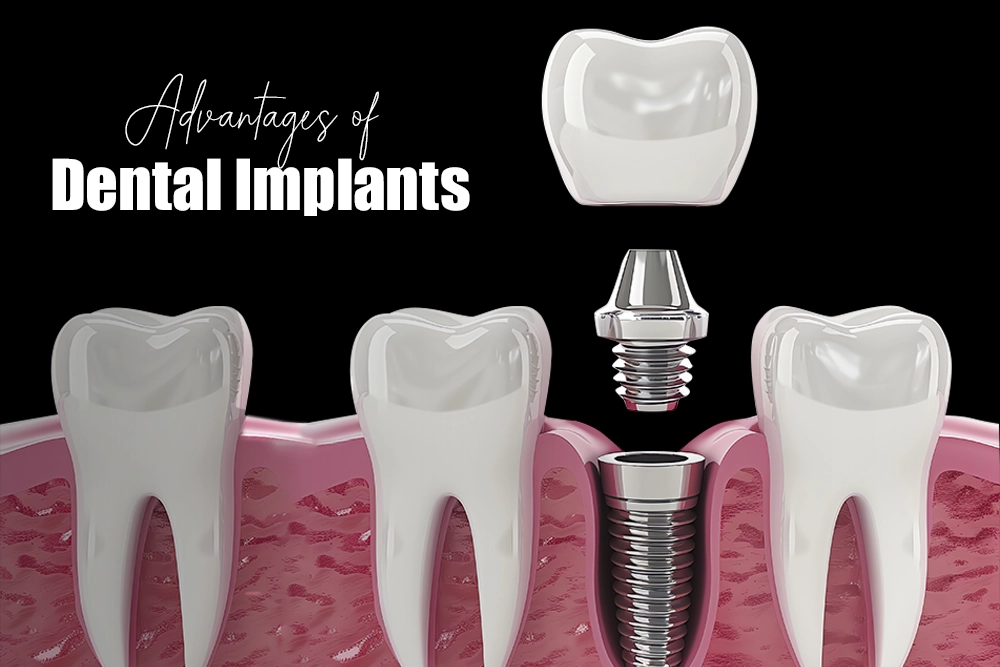Dental Implants are a popular choice for replacing a missing tooth or several teeth and can often be covered by dental insurance. associated with dental surgery serve as artificial teeth replacing the natural ones. have become a popular choice for individuals seeking a permanent solution to tooth loss. Unlike traditional dentures or bridges, dental implants offer several unique benefits that make them an attractive option for restoring smiles.
Significant advantage is the long-term stability provided by dental implants to replace teeth. natural look and feel of dental implants associated with dental health benefits. Because they are designed to match the color and shape of your natural teeth, implants blend seamlessly with your existing teeth, providing a more natural appearance. Additionally, they function like natural teeth, allowing you to eat, speak, and smile with confidence.
Dental implants also play a crucial role in preventing bone loss. When a tooth is lost, the jawbone begins to deteriorate over time. Implants stimulate the bone, just like natural teeth, helping to maintain the bone structure and prevent further deterioration, which is one of the health benefits of dental implants.
Furthermore, dental implants do not require the alteration of adjacent teeth. Unlike traditional bridges, which rely on neighboring teeth for support, implants are independent structures. This means that the health of your remaining natural teeth is preserved, contributing to overall oral health, a key health benefit of dental implants compared to other solutions.
What Are The Advantages And Disadvantages Of Dental Implants?
Dental implants offer a permanent solution for tooth loss with several benefits and some potential drawbacks. One of the key benefits and risks advantages of dental implants is their durability and longevity. Made from biocompatible materials like titanium, implants fuse with the jawbone, providing a stable foundation that can last a lifetime with proper care, illustrating how dental implants can last. They also look and function like natural teeth, enhancing both aesthetics and oral function.
Another significant dental implant benefit is the preservation of jawbone health. Unlike traditional dentures, implants stimulate the bone, preventing the bone loss that typically follows tooth loss, which is a significant advantage when you lose a tooth. This helps maintain the structure of your face and jaw, contributing to overall oral health.
However, there are also disadvantages, along with benefits and risks associated with dental implants to consider for anyone who might lose a tooth. The implant procedure can be costly, especially compared to other tooth replacement options like dentures or bridges. Additionally, the process requires surgery, which carries inherent risks such as infection, nerve damage, and prolonged healing time.
Another drawback is the time commitment involved in the dental implant procedure and any additional minor dental work required. The entire process, from dental surgery for implant placement to final restoration, can take several months, requiring multiple dental visits and a significant investment of time.
In summary, while implants offer the benefits of durability, natural appearance, and bone preservation, they also come with higher costs, surgical risks, and a longer treatment timeline, weighing the benefits and risks. It’s essential to weigh these factors carefully and consult with a dental professional to determine the best option for your needs as a candidate for dental implants compared to other options.
Dental Implants Is Safe
Dental implants are widely regarded as a safe and effective solution for tooth replacement. This procedure has a high success rate, particularly when performed by experienced dental professionals, making the implant treatment highly reliable. Dental implants are made from biocompatible materials, which are well-tolerated by the body and integrate seamlessly with the jawbone.

The safety of dental implants largely depends on individual factors such as overall health, oral hygiene, and adherence to post-operative care instructions. Modern dental techniques and the numerous significant benefits associated with dental implants and advanced technology further enhance the safety and success of the dental procedure. However, as with any surgical procedure, there are potential risks, including infection, nerve damage and implant failure. These risks are minimal when proper protocols are followed.
In conclusion, dental implants are a safe and reliable option for tooth replacement, offering long term benefits and improved quality of life. Consult with a qualified dentist to determine if implants are the right choice for you.
Advantages of Dental Implants Over Bridges
Dental implants offer several advantages over traditional dental bridges. Dental Implants Dental implants provide a permanent and more natural looking solution for missing teeth, highlighting a significant health benefit of replacing a missing tooth with implants. Unlike bridges, implants do not require the alteration of adjacent healthy teeth, preserving their natural structure.
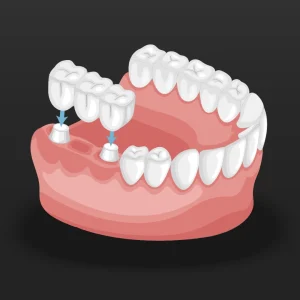
Implants are embedded directly into the jawbone, which helps maintain bone density and prevents bone loss, a common issue with bridges, showing that dental implants can last long. This integration also provides superior stability and functionality, allowing for better chewing and speaking abilities. Additionally, dental implants have a longer lifespan and require less maintenance compared to bridges, making them a more cost effective and durable option in the long run.
Choosing dental implants to replace one or more missing teeth over bridges ensures a more comfortable, natural, and lasting solution for tooth replacement, enhancing overall oral health and quality of life.
Advantages Of Titanium Dental Implants
Titanium dental implants offer numerous benefits for those seeking long term tooth replacement solutions. One of the key advantages is their biocompatibility; titanium integrates seamlessly with the jawbone through a process called osseointegration. This ensures a strong and stable foundation for the replacement teeth.
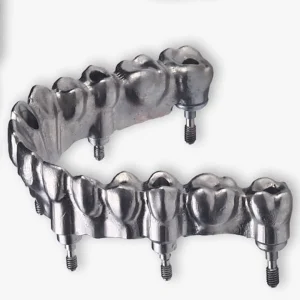
These implants are also highly durable, capable of withstanding the daily pressures of chewing and speaking. Their longevity makes them a cost-effective choice, often lasting a lifetime with proper care, and may even be covered by dental insurance.
Having implants not only restores the natural function and appearance of teeth but also promotes overall oral health by preserving jawbone density and preventing bone loss.
What Do Dental Implants Look Like?
Dental implants are designed to look and function like natural teeth. The implant itself is a small titanium post that is surgically placed into the jawbone, where it serves as a root for the replacement tooth. This post is typically not visible once it is embedded in the bone and serves as an implant abutment to support the artificial teeth.
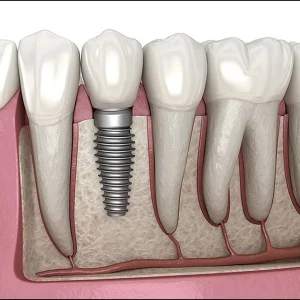
On top of the implant, an abutment is attached. This is a connector that holds the replacement tooth or crown, in place, playing a crucial role around the implant. The crown is custom made to match the size, shape, and color of your natural teeth, making it virtually indistinguishable from the rest of your smile.
Overall, being a candidate for dental implants can significantly improve quality of life. implants provide a realistic and aesthetically pleasing solution for missing teeth, restoring both appearance and functionality.
Can Dental Implants Be Removed?
Dental implants are designed to be a permanent solution for missing teeth and often involve placing an artificial tooth. The titanium post, which serves as the implant, is surgically inserted into the jawbone and integrates with the bone over time, creating a stable and long-lasting foundation for the replacement tooth. This process, known as osseointegration, is intended to make the implant a permanent part of your mouth.
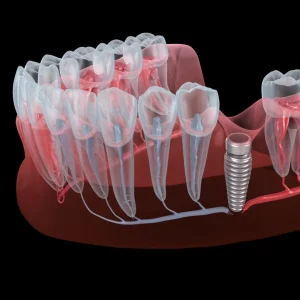
However, in certain circumstances, such as infection, implant failure or damage to the surrounding bone, dental implants may need to be removed. Removing an implant can be a complex procedure, as it involves careful extraction to avoid damaging the surrounding bone and tissues. After removal, a new implant can often be placed, or other restorative options can be considered, depending on the dental implant procedure and whether dental insurance covers it.
In summary, while dental implants are meant to be permanent, they can be removed if necessary, though the procedure requires professional care and expertise.
Dental Implants With Bone Graft
Dental implants are a popular solution for replacing missing teeth but successful implantation requires sufficient bone density in the jaw. For patients with inadequate bone, a bone graft may be necessary to provide a stable foundation for the implant.
A bone graft involves taking bone material from another part of the patient’s body or using a synthetic or donor bone to build up the deficient area. This procedure helps regenerate new bone growth, ensuring that the jaw can support the dental implant, which offers substantial health benefits of dental implants.
Once the grafted bone has healed and integrated with the existing bone, a dental implant can be securely placed, illustrating the overall dental implant procedure. This combined approach of dental implants with bone grafting allows patients with bone loss to enjoy the benefits of stable, long lasting implants.
A Comprehensive GuideFor Dental Implants
Dental implants are an excellent solution for individuals who have lost a tooth or teeth. Being a suitable candidate for dental implants typically requires good gum health and sufficient bone density to support the implant abutment, ensuring that the implant replaces the root effectively. Unlike traditional dentures or bridges, dental implants are designed to replace the root of the missing tooth, providing a sturdy foundation for artificial teeth. This process is associated with dental surgery, which involves placing the implant into the jawbone, usually to replace a missing tooth.
One of the significant benefits of dental implants is their ability to function like your natural teeth, enhancing your ability to chew and speak without difficulty. dental implants can prevent the surrounding teeth from shifting and can improve your overall dental health by maintaining the structure of your jawbone.
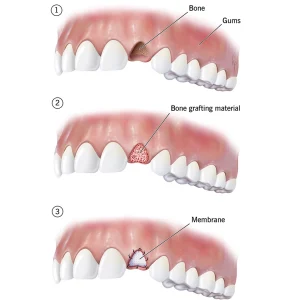
The dental implant process starts with an implant consultation, where a dental professional will evaluate your suitability for the procedure. Questions about dental implants, such as the cost of dental implants and the types of dental implants available, will be addressed during this consultation, along with the coverage provided by dental insurance. The cost can vary significantly based on the number of implants needed and the specific dental practice.
Dental implant surgery involves several steps, including the placement of the implant and attaching the artificial tooth. This surgical procedure has risks and complications, just like any other surgery, but it also offers significant benefits, such as preventing bone loss and preserving your natural facial structure.
Implants are usually designed to match your natural teeth, making them a more aesthetically pleasing option than treatments such as dentures or bridges. Despite the advantages, it’s important to be aware of signs of implant failure and understand that implants may need to be replaced over time.
In conclusion, dental implants can provide a long-term solution for replacing missing teeth, offering both functional and cosmetic benefits. Whether you are replacing a single tooth or seeking a full set of teeth, dental implants are a durable and effective option that can greatly enhance your quality of life.
Follow us on Social Media
internationalplusofficial
internationalplus
internationalplusdental
International Plus was established from scratch in 2014 with the sole purpose of providing a world class center for plastic and cosmetic surgery by SAMİLSAN SAĞLIK HİZMETLERİ TURİZM DANIŞMANLIK TİCARET LİMİTED ŞİRKETİ International Plus has developed a worldwide reputation for its unique treatments and techniques. With over 10 years of experience, our talented medical experts are among the best in their respective fields. You are our priority. We are convinced that good communication between you and your surgeon is essential when planning your treatments. We offer realistic advice and the most suitable treatments for you.

